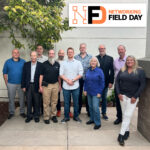|
|
This video is part of the appearance, “Graphiant Presents at Networking Field Day 39“. It was recorded as part of Networking Field Day 39 at 9:00-10:30 on November 5, 2025.
Watch on YouTube
Watch on Vimeo
Graphiant’s CSO, Arsalan Khan, detailed use cases focused on this challenge, beginning with unified connectivity. He explained that the Graphiant fabric treats all endpoints, public clouds, data centers, and emerging AI neoclouds, as part of a single any-to-any fabric. This model eliminates the need for traffic backhauling, providing lower latency and guaranteed paths for high-bandwidth AI workloads, all while ensuring data privacy with end-to-end encryption that is never decrypted in transit.
Khan then highlighted business-to-business data exchange and data assurance as key enablers for AI. The platform simplifies partner collaboration, which is critical for many AI ecosystems, by handling network complexities like IP overlapping and NAT. This capability extends to partners not on the Graphiant platform and includes the ability to dynamically revoke access if a partner is breached. The core data assurance use case provides a centralized tool for CISO and governance teams. Using role-based access control, they can enforce network-level policies, such as ensuring specific data never leaves a geographical boundary, rather than relying on individual application developers to implement compliance.
Finally, Khan addressed how this infrastructure specifically serves AI workloads. He clarified the strategy is “networking for AI,” meaning the platform is designed to offload the complex burden of security and data governance from AI applications to the network itself. This accelerates AI deployment by simplifying compliance. The system supports this with threat intelligence that, without inspecting encrypted payloads, uses public feeds and behavioral analysis. By classifying normal application flows, the network can detect and flag erratic behavior, providing an essential layer of security for moving and processing the large, sensitive data “haystacks” required by AI.
Personnel: Arsalan Mustafa Khan








